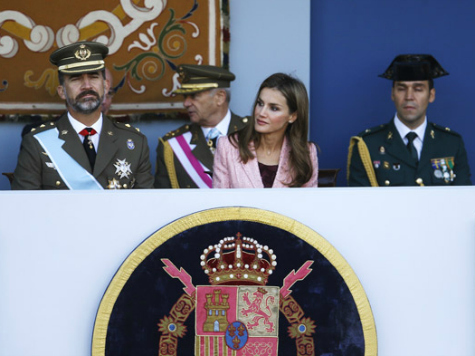
A survey from El Mundo this week shows some conflicting feelings within the Spanish population towards their royal family: more than half want the monarchy gone, but more than half have faith in Prince Felipe of Asturias, the heir to the crown.
The study, commemorating King Juan Carlos’ 76th birthday, found that his popularity as an individual fell nine points over 2013, and support for monarchy as an institution fell to 49%. The precipitous drop comes as no surprise to those following Spanish politics. The Royal Family’s two biggest news stories this year were the King’s flamboyant elephant hunting trip to Botswana – where he fractured his hip – and his son-in-law’s embezzlement scandal. That story, of his daughter Cristina, Duchess of Parma, and her husband, former Olympian Iñaki Urdangarín (Duke of Parma), not only involved elaborate schemes to make money off of false contracts with a sports nonprofit, but an email scandal in which Urdangarín is seen mocking his sister-in-law, Princess Letizia of Asturias, to his wife with lewd language about her time as a commoner and journalist on national Spanish television. Urdangarín made increasingly few appearances at family functions and on the Royal Family’s website as the year went on. The Botswana incident was a more minor scandal, but due to the current economic suffering many in Spain are facing, those polled found the incident in very bad taste.
Perhaps because Letizia became Urdangarín’s target of mockery, or perhaps because of her husband’s seemingly teflon ability to stay out of the loop of these disgraces, Prince Felipe of Asturias was the only member of the Royal Family for whom public opinion improved over 2013. 66% of Spaniards polled have a good or very good opinion of the crown prince. He is still not more popular than his mother, Queen Sofía, who garnered a 67% popularity rating, but the Queen has managed a stable public opinion rather than the improvements her son saw. 57% of those polled by El Mundo claimed faith in Prince Felipe to “restore the prestige of the Bourbon family.”
Opposition to the monarchy has been for many years a bipartisan issue in Spain. The Spanish left, many of whom support radical secession movements like that in Cataluña, see the monarchy as an archaic and conservative institution that oppresses the poor. The Spanish right, which tends to be socially and economically libertarian but holds hawkish foreign policy views, often laments that the country could not be more like America and objects to taxpayers’ dollars paying for ornamental leaders. Only paleo-conservative Spaniards support the monarchy generally, due to its major role in transitioning the nation out of the Franco era into a viable democracy.

COMMENTS
Please let us know if you're having issues with commenting.